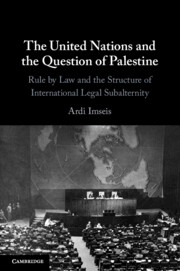‘This is a scholarly, well-reasoned analysis that constitutes a legal brief for Palestinian self-determination and statehood. … Recommended.’
D. P. Forsythe
Source: CHOICE
‘This book is essential for scholars, policymakers, and anyone interested in the intricacies of international law, the role of the UN, and the broader implications for global governance in conflict zones, especially the Palestinian-Israeli conflict. Through his rigorous examination, Imseis not only highlights the deficiencies within the current system but also calls for a renewed commitment to genuine legal and political reform to uphold the rights and aspirations of the Palestinian people.’
Chaoqun Lian
Source: China International Strategy Review
‘This is a much-needed contribution to a fragmented literature from a scholar who is deeply familiar with the history of the UN’s approach to the Palestinian question. Given the many debates, actors, laws, institutions and procedures involved … this book represents a significant accomplishment. It is a must-read for anyone who wants to understand the role of the UN in the conflict while also setting the stage for future research, speaking to the disciplines of international law, global history and international relations.’
Daniela Huber
Source: Italian Journal of International Affairs
'He very effectively argues that international law is indispensable to the making of a better world, and the very best of international law reflects the very best of our humanity. It sets strong rules for state and organizational behaviour, particularly in times of war and conflict, in times of oppression and the denial of rights, but also in times of hope and possibility.'
Michael Lynk
Source: Global Justice Journal
‘Although the range of sources and the breadth of materials may seem ambitious, Imseis effectively organizes them into a coherent analysis. … Despite the profound criticism owed to the international legal setting and its relationship with Palestine, Imseis remains cautiously hopeful about the counter-hegemonic potential of international law. … He does not surrender to scepticism about international law and international legal institutions, notwithstanding their colonial origins, and envisions a future for the state of Palestine within which the Palestinians would find emancipation through the respect of well-established international legal norms.’
Andrea Maria Pelliconi
Source: Journal of International Humanitarian Legal Studies



